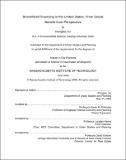Brownfield financing in the United States : from social benefit-cost perspective
Author(s)
Xu, Rongtao
DownloadFull printable version (2.262Mb)
Other Contributors
Massachusetts Institute of Technology. Center for Real Estate.
Advisor
Karen R. Polenske.
Terms of use
Metadata
Show full item recordAbstract
Since 1995, the government has launched brownfield financing programs to promote brownfield cleanup and redevelopment in the United States. These programs have lowered financial barriers for brownfield developers and returned vibrant properties to communities. In this study, I focus on examining the efficiency of these incentives from the social perspective and proposing optimal funding decision rules. I hypothesize that brownfield funds are not allocated optimally in some cases. First, I investigate the current brownfield financing programs at federal, state, and local levels. Second, based on externality and welfare economics theories, I propose an optimal funding-decision flow chart. Third, by testing my hypothesis on three brownfield cases in Massachusetts, I perform social benefit-cost analyses and determine whether brownfield funds were justified by their social returns. Finally, I discuss the major findings from these case studies and point out ways to improve current brownfield financial and non-financial policies. Based on theoretical analyses, I propose that the government should not sponsor projects with positive private net present values, but rather focus on projects that have positive net present social values and not feasible without subsidies. (cont.) In the real world, it is difficult to measure the social benefits of a brownfield redevelopment accurately, especially before a development project is completed. Hedonic models show that only one of three cases exhibit significant positive enhancement on housing values after redevelopment.. Only development of a simple rule-of-thumb benefit assessment toll would make an optimal brownfield funding decision possible.
Description
Thesis (M.C.P. )--Massachusetts Institute of Technology, Dept. of Urban Studies and Planning; and, (S.M. in Real Estate Development)--Massachusetts Institute of Technology, Dept. of Urban Studies and Planning, Center for Real Estate, 2006. This electronic version was submitted by the student author. The certified thesis is available in the Institute Archives and Special Collections. Includes bibliographical references (leaves 101-103).
Date issued
2006Department
Massachusetts Institute of Technology. Center for Real Estate; Massachusetts Institute of Technology. Department of Urban Studies and PlanningPublisher
Massachusetts Institute of Technology
Keywords
Urban Studies and Planning., Center for Real Estate.